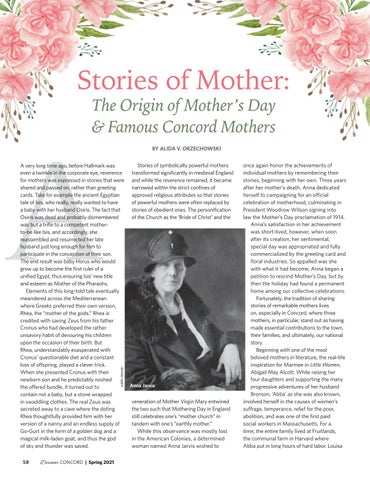Stories of Mother: The Origin of Mother’s Day & Famous Concord Mothers
A
BY ALIDA V. ORZECHOWSKI
public domain
Stories of symbolically powerful mothers A very long time ago, before Hallmark was transformed significantly in medieval England even a twinkle in the corporate eye, reverence for mothers was expressed in stories that were and while the reverence remained, it became narrowed within the strict confines of shared and passed on, rather than greeting approved religious attributes so that stories cards. Take for example the ancient Egyptian of powerful mothers were often replaced by tale of Isis, who really, really wanted to have stories of obedient ones. The personification a baby with her husband Osiris. The fact that of the Church as the ‘Bride of Christ’ and the Osiris was dead and probably dismembered was but a trifle to a competent motherto-be like Isis, and accordingly, she reassembled and resurrected her late husband just long enough for him to participate in the conception of their son. The end result was baby Horus who would grow up to become the first ruler of a unified Egypt, thus ensuring Isis’ new title and esteem as Mother of the Pharaohs. Elements of this long-told tale eventually meandered across the Mediterranean where Greeks preferred their own version, Rhea, the “mother of the gods.” Rhea is credited with saving Zeus from his father Cronus who had developed the rather unsavory habit of devouring his children upon the occasion of their birth. But Rhea, understandably exasperated with Cronus’ questionable diet and a constant loss of offspring, played a clever trick. When she presented Cronus with their newborn son and he predictably noshed Anna Jarvis the offered bundle, it turned out to contain not a baby, but a stone wrapped veneration of Mother Virgin Mary entwined in swaddling clothes. The real Zeus was the two such that Mothering Day in England secreted away to a cave where the doting still celebrates one’s “mother church” in Rhea thoughtfully provided him with her tandem with one’s “earthly mother.” version of a nanny and an endless supply of While this observance was mostly lost Go-Gurt in the form of a golden dog and a in the American Colonies, a determined magical milk-laden goat, and thus the god woman named Anna Jarvis wished to of sky and thunder was saved. 58
Discover CONCORD
| Spring 2021
once again honor the achievements of individual mothers by remembering their stories, beginning with her own. Three years after her mother’s death, Anna dedicated herself to campaigning for an official celebration of motherhood, culminating in President Woodrow Wilson signing into law the Mother’s Day proclamation of 1914. Anna’s satisfaction in her achievement was short-lived, however, when soon after its creation, her sentimental, special day was appropriated and fully commercialized by the greeting card and floral industries. So appalled was she with what it had become, Anna began a petition to rescind Mother’s Day, but by then the holiday had found a permanent home among our collective celebrations. Fortunately, the tradition of sharing stories of remarkable mothers lives on, especially in Concord, where three mothers, in particular, stand out as having made essential contributions to the town, their families, and ultimately, our national story. Beginning with one of the most beloved mothers in literature, the real-life inspiration for Marmee in Little Women, Abigail May Alcott. While raising her four daughters and supporting the many progressive adventures of her husband Bronson, ‘Abba’ as she was also known, involved herself in the causes of women’s suffrage, temperance, relief for the poor, abolition, and was one of the first paid social workers in Massachusetts. For a time, the entire family lived at Fruitlands, the communal farm in Harvard where Abba put in long hours of hard labor. Louisa

























